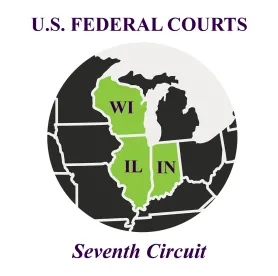The US Court of Appeals for the Seventh Circuit reversed the lower court’s order determining that the plaintiff’s federal lawsuit was barred under the doctrines of claim and issue preclusion, noting an Illinois law exception on claim preclusion and finding no issue preclusion. Creation Supply, Inc. v. Selective Ins. Co. of the Southeast, Case No. 21-3172 (7th Cir. Oct. 19, 2022) (Rovner, Hamilton, Scudder, JJ.)
Creation Supply is a producer of markers. In 2012 one of its competitors sued it for trademark violations. Creation requested that Selective Insurance provide coverage for the lawsuit, but Selective refused. Creation entered into a settlement agreement with its competitor that prevented Creation from selling one of its primary lines of markers. As a result, Creation lost much of its business and struggled financially.
Selective did not provide coverage for Creation’s legal defense. It also sought a declaration in Illinois state court that it owed Creation no duty to defend. Creation countersued, seeking a declaration that Selective did owe it a duty to defend. Creation also alleged that Selective breached the insurance policy between the parties. The Illinois circuit court entered partial summary judgment for Creation on its duty to defend the claim and finalized an award of incidental relief in October 2017.
In 2014, during the state court litigation, Creation filed a suit against Selective in federal court for breach of contract and a claim under the Illinois Insurance Code for vexatious and unreasonable conduct. In 2016, Creation requested voluntary dismissal of the state court breach of contract claim. The Illinois circuit court granted the motion and expressly reserved Creation’s right to maintain its federal action on its breach of contract claim. After the end of the state court litigation in 2017, the federal court case continued. The district court granted summary judgment for Creation on the insurance coverage question. After a bench trial on the Illinois Insurance Code claim, the court found for Creation and awarded almost $3 million in damages. On appeal, the Seventh Circuit reversed and remanded, instructing the district court to resolve the remaining issue of contract damages.
After the remand, Creation sought to amend the complaint to seek punitive damages. The district court denied that request. Selective then moved for judgment on the pleadings, contending that the doctrines of claim and issue preclusion barred Creation’s remaining contract claim. The district court agreed and entered judgment for Selective because the Illinois state courts had resolved the issue of Selective’s duty to defend. Creation appealed.
The Seventh Circuit affirmed the district court’s denial of Creation’s leave to amend, then turned to the issue of claim preclusion, a legal doctrine that prevents a party from repeatedly litigating the same cause of action against the same adverse party. Claim preclusion requires the following:
-
A court with proper jurisdiction must have issued a final judgment on the merits.
-
The claims in the two actions must be the same.
-
The parties in the second action must be the same (or in privity with) those from the first.
However, Illinois law recognizes an exception that permits an action if the court in the first action expressly reserved the plaintiff’s right to maintain the second action. Because this is exactly what the Illinois circuit court did, the Seventh Circuit found that claim preclusion did not bar Creation’s claims.
Next, the Seventh Circuit turned to Selective’s issue preclusion argument. Issue preclusion prevents a party from relitigating an issue that it has previously litigated and lost. The Court stated that issue preclusion does not prevent multiple rounds of litigation in the same manner as claim preclusion. Instead, issue preclusion narrows the scope of the disputed issues in subsequent lawsuits. The Court explained that issue preclusion did not apply to the remaining contract damages claims because the issue of contract damages was never resolved.
The Seventh Circuit reversed the district court in this decade-old legal battle and sent the case back to the district court to resolve the remaining issues on the breach of contract damages. The Court noted that it regarded the protracted litigation in federal and state courts, at trial and appellate levels as “peculiar” and “an anomaly,” and stated that “[w]e entrust the management of this remaining issue to the district court’s sound discretion.”



 />i
/>i
